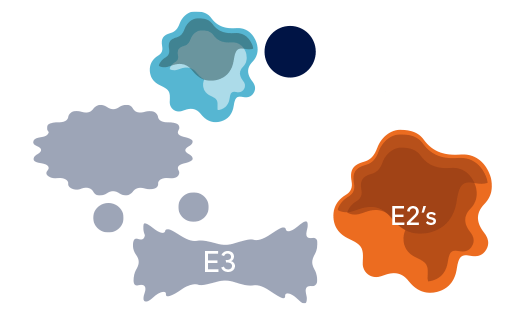
Ubiquitin and Ubls
Ubiquitin and Ubls
Ubiquitin proteins, mutants, and chains as well as Ubiquitin like proteins SUMO, ISG15, NEDD, UFM, and FAT10. Over 70 ubiquitin proteins available in a wide range of tags. All the essential building blocks to make your in vitro assays a success.

E3 Ligases + Targeted Protein Degradation
E3 Ligases + Targeted Protein Degradation
- Single-subunit E3 Ligases
- Multi-subunit E3 Complexes including Neddylated Cullins
- E3 Inhibitors
- PROTACs® and Targeted Protein Degradation
There are over 600 genes that code for E3 ligases in the human genome. E3 ligases typically confer target specificity for ubiquitination in addition to the enzymatic role of adding ubiquitin. Several E3 ligases have become popular components used with small molecule degraders in the promising field of targeted protein degradation (TPD).

Deubiquitinating Enzymes (DUBs)
Deubiquitinating Enzymes (DUBs)
The process of protein ubiquitination is reversible. DUBs are a large class of enzymes that remove ubiquitin from proteins. They play a diverse role across many pathways and often function in direct contact with the proteasome.

E1 Enzymes
E1 Enzymes
E1 enzymes are ubiquitin activating enzymes that catalyze the first step in the ubiquitination process. They bind ubiquitin in an ATP-dependent manner via an internal cysteine residue. This ubiquitin bound to a E1 enzyme is then transferred to an E2 enzyme.

E2 Enzymes
E2 Enzymes
E2 enzymes, or ubiquitin-conjugating enzymes are involved in the transfer of ubiquitin to a target protein. There are about 40 human E2 enzymes.

Proteasome
Proteasome
The proteasome is the primary way cells degrade proteins. This mutiprotein complex containing multiple proteases forms a tube-like structure where proteins are degraded as they pass through. Bioactive, purified proteasomes are ideal for studying in vitro degradation of a protein of interest.

Accessory Proteins
Accessory Proteins
Accessory proteins are kinases and heat shock proteins that act as E3 ligase cofactors and proteins involved in aggresomal disorders such as Tau and alpha-Synuclein.

Substrates
Substrates
A wide range of biotinylated and fluorogenic peptide substrates used for in vitro proteasome experiments.

Ubiquitin-related Resources
Ubiquitin-related Resources
• A Chemical Toolbox to Support PROTACs
• Targeted Protein Degradation Guide
Utilize our ubiquitin-related resources to learn more about the generation of a toolbox of building blocks for the development of Degraders and products available from Bio-Techne to support targeted protein degradation research.
Background Information
R&D Systems Ubiquitin Proteasome Group, formerly known as Boston Biochem, has over 20 years of experience developing products for studying ubiquitin proteasome biology. Our experience in protein expression, purification, and assay development, coupled with our close relationship with the ubiquitin proteasome system research community, has allowed us to build the most comprehensive portfolio of tools for ubiquitin research. Our catalog includes the highest quality ubiquitin and ubiquitin-like proteins, E1, E2, and E3 enzymes, deubiquitinating enzymes, and multienzyme complexes, including neddylated cullins for targeted protein degradation (TPD) assays. As the field continues to evolve, we remain dedicated to providing ubiquitin proteasome researchers with the tools that are needed to accelerate both basic protein degradation research and drug discovery efforts. If there is a reagent that you can’t find on our website, please contact us and our Custom Protein Services team will work with you to develop a customized product that meets your needs.
PROTAC® is a registered trademark of Arvinas Operations, Inc., and is used under license.





